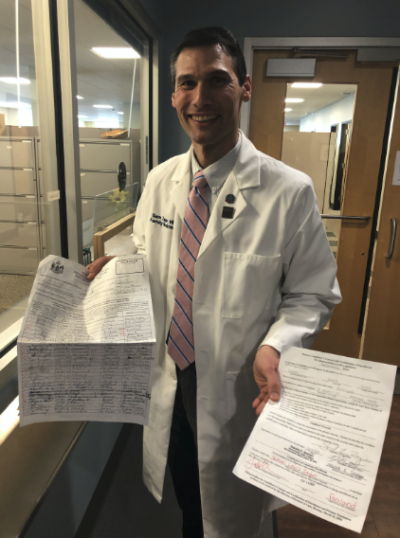 Dr. Sam Zager – Portland. Family Doctor, Naval Academy graduate, and new state legislator.
Dr. Sam Zager – Portland. Family Doctor, Naval Academy graduate, and new state legislator.
Dr. Sam Zager graduated from the United States Naval Academy. After serving as an intelligence officer in the navy he enrolled in Harvard Medical School. He then completed his residency in Family Medicine at Maine Medical Center. He is a Clinical Assistant Professor of Family Medicine at Tufts School of Medicine. In full time practice at Martin’s Point in Portland, he has just been elected to the State Legislature, representing District 41 in Portland. Sam took a few minutes out of his busy day to share some thoughts about Family Medicine and his new role as a state legislator.
Why did you choose Family Medicine? I felt at home philosophically in Family Medicine. It fits my diverse interests in patient care. Although there was no Family Medicine department at Harvard, I engaged with the STFM Family Medicine Consortium, which provided me with my original inspiration and guidance.
What gives you joy in Family Medicine?
I enjoy the variety and the deep relationships with patients. I especially get joy out of being responsive to the needs of the community and being a participant in positive change for my patients. An example of this is my work treating opioid dependent patients with suboxone.
What is your biggest frustration?
I want to do right by my patients, and I find the healthcare system is either creaking or broken. One of my goals as a state legislator is to reform the healthcare system so that primary care is empowered to provide better and more efficient care.
As a legislator, what are some of your main goals?
My overarching goal is to truly commit to helping the lives of the people in my district and my state. Further, I intend to set a tone of decency and civility in our political discourse.
I have sponsored a number of bills with these goals in mind.
First, Senator Ned Claxton, a fellow Family Physician and I have sponsored LR 740, the Primary Care Investment Act. This bill will require health plans to increase the percentage spent on primary care from 5-6% where it currently is up to 10%. This will lead to a stronger system of primary care that can deliver better outcomes and hold down costs.
I have also sponsored the Doctors for Maine Futures bill, which provides scholarships for Maine medical students.
Another bill I have sponsored regulates the possession of ghost guns, which are plastic guns made on 3D printers. It would require them to be registered like regular guns and would make it illegal to bring them into schools.
Lastly, I have introduced legislation that would study the implications of gene-editing such as CRISPR. This is such a promising new frontier in medicine and society, and I would like to see Maine take a leading role in its implementation.
What do you see as the biggest challenges to Family Medicine?
I see the need for Family Doctors to be the leaders in a health care system that has rapidly changing demographics and technologies. We don’t get enough explicit training in leadership. I would like to apply my experience in the military in building leadership skills to graduate medical education, so that we can be better team leaders.
How do you balance clinical, legislative and family life?
I always ask myself the question, “What are you not willing to give up?” My two inviolate answers are my character and integrity, and my family. Note that I did not mention being unwilling to give up being a doctor or a legislator. It is a constant battle for me to balance home and work life. And there are times when I have to make the choice of taking the Zoom policy meeting or helping my daughter with her homework. It is a constant struggle to set those boundaries, and being able to walk away when necessary.
Final thoughts?
Both my career as a Family Doctor and my new role as legislator have taught me how humility is so important. I am realizing how little I know and how much more I need to learn to be a good lawmaker. This guides me moving forward to better serve both my patients and my constituents.
